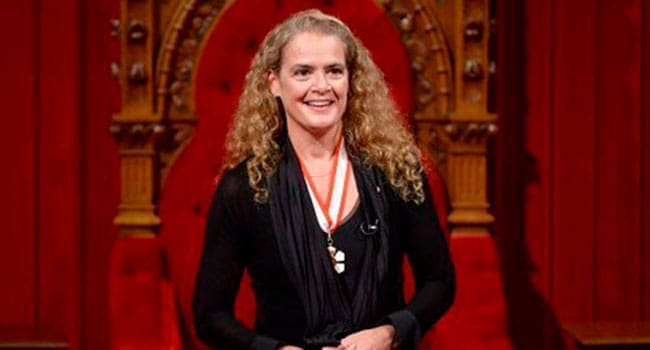 It only took one speech for new Canadian Gov. Gen. Julie Payette to confirm why some columnists and pundits (including me) were lukewarm about her nomination in the first place.
It only took one speech for new Canadian Gov. Gen. Julie Payette to confirm why some columnists and pundits (including me) were lukewarm about her nomination in the first place.
“Oh, but she’s an astronaut and a scientist,” crowed her enthusiastic support base during the dog days of summer. “She’ll bring a fresh new outlook and diverse opinions to an old, staid ceremonial position.”
I could certainly go for some old, staid representation right now.
Anything would be better than Payette’s politically-charged diatribe last week to the Canadian Science Policy Conference. The Governor General deviated from her speaking notes (one assumes – and hopes) and went rogue on several occasions.
“Can you believe that still today in learned society,” she said, “in houses of government, unfortunately, we’re still debating and still questioning whether humans have a role in the Earth warming up or whether even the Earth is warming up, period?”
She said she was dismayed “we are still debating and still questioning whether life was a divine intervention or whether it was coming out of a natural process let alone, oh my goodness, a random process.”
To top it off, she mockingly exclaimed, “so many people – I’m sure you know many of them – still believe, want to believe, that maybe taking a sugar pill will cure cancer, if you will it!” Or that people believe that “every single one of the people here’s personalities can be determined by looking at planets coming in front of invented constellations.”
Who knew our new Governor General was a graduate of Prime Minister Justin Trudeau’s prestigious school for the dramatic arts?
Payette’s disrespectful comments tarnish her respectful, ceremonial and constitutional position as Queen Elizabeth II’s federal viceregal representative. It’s not her place, or her role, to attack Canadians who don’t believe in some or all of the science surrounding climate change, hold a different opinion in the creation-evolution debate, have doubts about modern medicine or enjoy astrology.
Moreover, Payette’s statements fly directly in the face of free speech and free expression. While some Canadians don’t respect these cherished values as much as their American cousins, it’s long been an important principle for the success and survival of western democratic thought.
While the Governor General has the right to her intolerant views about others, she must grant that same right to people of opposing views who she finds ill-informed. To paraphrase the late U.S. columnist Nat Hentoff, it has to be free speech for me – and thee.
Instead, she has infuriated religious Canadians and free-thinking individuals of all political stripes and walks of life. And she’s only been on the job since Oct. 3.
Trudeau doesn’t seem terribly concerned about this controversy and has strongly defended her statements. “I am extraordinarily proud of the strength and the story of our Governor General, Julie Payette, who has never hidden away her passion for science and her deep faith that knowledge, research and the truth is a foundation for any free, stable, successful society,” he recently said. “And I applaud the firmness with which she stands in support of science and the truth.”
Alas, Trudeau doesn’t seem to understand his version of the truth is somewhat different than other versions in his native land. This includes political opponents and, whether he cares to admit it or not, political proponents.
Is this a one-time outburst by the Governor General? You would hope so. But Trudeau has clearly opened the invisible door for her with respect to just about anything under the sun.
If this trend continues, there’s one option (albeit a massive long shot) that frustrated Canadians could consider doing.
The Governor General traditionally serves for a five-year term. But it’s actually unfixed and done “at Her Majesty’s pleasure.”
Maybe the Queen would be pleased to become more informed about her controversial Canadian representative. Just sayin’.
Michael Taube, a Troy Media syndicated columnist and Washington Times contributor, was a speechwriter for former prime minister Stephen Harper. He holds a master’s degree in comparative politics from the London School of Economics.
The views, opinions and positions expressed by columnists and contributors are the author’s alone. They do not inherently or expressly reflect the views, opinions and/or positions of our publication.

